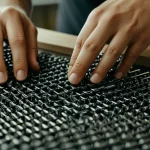Top recommended materials for sustainable flooring in UK homes
When choosing sustainable flooring materials UK, several options combine eco-friendliness with durability and climate suitability. The best green floor coverings often include bamboo, cork, reclaimed wood, and linoleum.
Bamboo stands out due to its rapid growth rate and strength, making it a highly renewable resource. It adapts well to the UK’s fluctuating humidity, maintaining stability without excessive warping. However, quality varies, so checking eco-certifications is essential.
Also to see : How can you personalize your UK rental property without permanent changes?
Cork is another excellent eco-friendly flooring option. Harvested from tree bark without harming trees, its natural insulation properties reduce energy consumption for heating. Cork’s softness also provides comfort underfoot and noise reduction, which suits UK homes well.
Reclaimed wood offers both environmental and aesthetic benefits. Salvaging timber reduces deforestation, and older woods often come from high-quality forests. It’s ideal for those seeking unique, characterful floors while minimizing environmental impact.
Also read : How can you create a pet-friendly environment in a UK home?
Linoleum is a natural product made from linseed oil and wood flour. It’s biodegradable and resists wear, suitable for busy UK households. Its antimicrobial qualities add to its appeal for sustainable flooring materials UK.
Selecting materials with strong eco-credentials, suited to UK climate, ensures long-lasting beauty and performance while supporting sustainability goals.
In-depth comparison of eco-friendly flooring materials
When choosing natural flooring options in the UK, understanding the nuances of materials like bamboo flooring UK, cork flooring UK, reclaimed wood flooring, and linoleum flooring UK is essential. Bamboo flooring UK stands out for its rapid renewability, growing much faster than hardwood. This makes it an ideal choice for environmentally conscious buyers. However, its performance in humid UK environments can vary, so sourcing from reputable UK suppliers who treat bamboo properly is crucial for longevity.
Cork flooring UK offers a unique balance of sustainability and comfort. Harvested without harming the tree, cork is resilient and naturally insulating, making it popular in UK homes. The harvesting process is environmentally friendly, and cork flooring UK is available through multiple UK suppliers, ensuring access to quality options.
Reclaimed wood flooring brings character and history, reducing demand for new timber and significantly lowering the carbon footprint. Sourcing reclaimed wood flooring in the UK often involves careful selection to ensure durability and style. It adds warmth and uniqueness that new materials can’t match.
Linoleum flooring UK, made from natural ingredients like linseed oil and wood flour, boasts a long lifespan and biodegradability. Its range of vibrant colours and patterns suits modern UK interiors seeking eco-conscious choices with style. Overall, these natural flooring options blend environment-friendly features with practical UK performance.
Evaluating environmental impact and certifications
Understanding the environmental impact of flooring choices is essential for sustainable home improvement. Certifications like FSC-certified flooring UK and PEFC provide assurance that timber originates from responsibly managed forests. These labels are vital markers within sustainable flooring certifications, signaling compliance with strict ecological and social criteria.
Low VOC (volatile organic compounds) emissions flooring is critical for maintaining good indoor air quality. UK environmental standards emphasize reducing VOCs to protect occupant health and minimize environmental harm. Choosing low-VOC flooring helps ensure that your home remains safe, especially for sensitive groups like children or those with respiratory issues.
When selecting materials, it’s advisable to purchase from suppliers and installers who hold recognized certifications. This ensures products meet sustainability benchmarks and installation meets environmental responsibility standards. Within the UK, prioritizing vendors with verified certifications safeguards against greenwashing and reinforces UK environmental standards.
By focusing on these certifications and emissions standards, homeowners can confidently contribute to environmental preservation while enhancing household wellbeing. Certified products like FSC-certified flooring UK demonstrate a commitment to sustainability while supporting ecosystems and communities globally.
Pros and cons of the top sustainable flooring materials
Exploring durability, maintenance, and aesthetics
When choosing sustainable flooring, understanding the balance between pros and cons is key to a long-lasting investment. Eco-friendly materials like bamboo and cork stand out for their durability. Bamboo, for example, can last up to 25 years with proper care, making it a strong candidate for families needing resilience. Meanwhile, cork offers excellent shock absorption, but may require refinishing every decade to maintain its appearance.
In terms of maintenance tips for sustainable floors, each material demands different care routines. Bamboo benefits from gentle cleaning with damp mops to avoid water damage, whereas cork’s porous nature means spills must be wiped immediately to prevent staining. Both require regular dusting to minimize grit that can scratch surfaces.
Aesthetic appeal varies significantly in UK homes. Bamboo’s rich tones suit modern interiors but might clash with traditional settings. Conversely, reclaimed wood offers unique character, albeit with uneven textures that some may find less practical. A primary eco-flooring durability concern is susceptibility to moisture, especially for wooden options, which can warp if exposed to damp UK climates.
Weighing these sustainable flooring pros and cons helps homeowners select materials that align with both lifestyle and environmental goals—maximizing beauty and function.
Practical considerations for UK homeowners
When selecting flooring for UK climate, it’s essential to consider moisture levels and temperature variations typical in British homes. Wooden floors, for instance, should have a stable finish to handle humidity without warping. Vinyl and laminate options offer good resistance to moisture, making them practical in areas prone to dampness, such as basements or kitchens.
Regarding sustainable flooring costs UK, the upfront price may be higher than conventional options, but the long-term benefits often justify the investment. Sustainable materials like bamboo or cork provide durability and are naturally insulating, reducing heating costs over time. That means homeowners can experience both energy savings and a smaller environmental footprint. Research consistently shows a balance between initial costs and long-term value.
For sourcing sustainable flooring UK products, it’s wise to explore suppliers who prioritize eco-friendly certifications and transparent sourcing policies. Trusted UK brands focus on renewable resources and ethical manufacturing. Local showrooms and online retailers often provide samples and detailed product information to help compare options effectively. Doing this helps ensure homeowners receive quality materials suited for their climate while supporting sustainable practices.
In sum, evaluating flooring performance, costs, and suppliers with a climate-specific and sustainability lens will help UK homeowners make informed, practical decisions.







